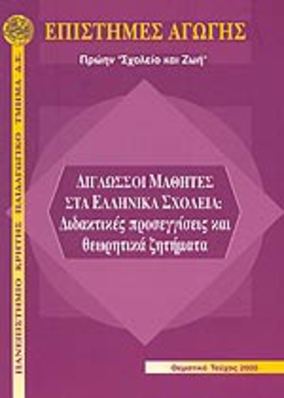Η δυνατότητα ανάπτυξης συνεργασίας μεταξύ νεοδιόριστων και έμπειρων εκπαιδευτικών πρωτοβάθμιας και δευτεροβάθμιας εκπαίδευσης στη διδακτική και εκπαιδευτική διαδικασία
Part of : Επιστήμες Αγωγής ; No.4, 2012, pages 7-19
Issue:
Pages:
7-19
Author:
Abstract:
Despite the fact that in international reality the role of the “mentor ” is clearly specified and closely related to the basic teacher training, in Greek bibliography and educational reality there is insufficient record and application regarding the documentation of the functionality of “mentoring” as a methodical framework of social and educational intervention. The present publication attempts to contribute to filling this gap, on the one hand, by giving emphasis on basic theoretical approaches to the functionality of “mentoring” and, on the other hand, by stressing highlighting the alternative implementation of “mentoring” in the Greek Primary and Secondary education as a supportive intervention in the effort made by entrants to education to materialize the teaching act.
Subject:
Subject (LC):
Keywords:
καθοδήγηση, διδασκαλία, εκπαίδευση εκπαιδευτικών, συνεργασία
Notes:
Περιέχει σημειώσεις και βιβλιογραφίες
References (1):
- ΕλληνικήΚακανά, Δ. (2006) Σύνδεση του πανεπιστημίου με τη σχολική κοινότητα με'σω τηςΠ.Α. Στο Ε. Ταρατόρη, κά. (επιμ.), Παιδαγωγικά Τμήματα: Παρελθόν, Παρόν,Μέλλον. Πρακτικά Πανελληνίου Συνεδρίου, Αλεξανδρούπολη 3-5/11/2006. Θεσσαλονίκη: Αφοί Κυριακίδη, 219-227.Καλαϊτζοποΰλου, Μ. (2001) Ο εκπαιδευτικός ως στοχαζόμενος επαγγελματίας,Αθήνα: Τυπωθήτω.Μάρκου, Σ. (2010) Νεαροί Μέντορες: Ενδοσχολικά προγράμματα "mentoring". ΣτοΕπιστήμες της Αγωγής. Τεύχος 1, 31-42.Μπαμπινιώτης, Γ. (1998) Αεξικό της Νέας ελληνικής γλώσσας. Αήμμα: «Μέντορας».Αθήνα: Κέντρο Λεξικολογίας ΕΠΕ., 1078.Μπούγλας, X. (2007) Ο ρόλος του μέντορα στην ΠΑ των υποψήφιων εκπαιδευτικών.Μεταπτυχιακή εργασία: Τομέας Παιδαγωγικής Φιλοσοφικής Σχολής ΑΠΘ.Θεσσαλονίκη.Παπαδοπούλου, B., I. Θωίδης & Ε. Τσακιρίδου (2006) Η Π.Α. στο ΠΤΔΕ Φλώρινας,Αντιλήψεις των συνεργαζόμενων εκπαιδευτικών. Στο Ε. Ταρατόρη κά. (επιμ.),Παιδαγωγικά τμήματα: Παρελθόν, παρόν και μέλλον. Πρακτικά ΠανελληνίουΣυνεδρίου, Αλεξανδρούπολη 3-5/11/2006. Θεσσαλονίκη: Αφοί Κυριακίδη, 241-250.ΦΕΚ 1340/16-10-2002 (Τεύχος Δεύτερο)Φύκαρης, I. (2010) Σύγχρονες διαστάσεις του διδακτικού έργου και ρόλου των εκπαιδευτικών: Δυνατότητες και προοπτικές. Θεσσαλονίκη: Αφοί Κυριακίδη.ΞενόγλωσσηBraund, Μ. (2001) "Helping privacy students Teacher understanding pupils Learning:exploring the student mentor interaction". Mentoring and tutoring. Voi. 9. No 3,189-200.Brinkman, G. & W. Schwark (2000) To προφίλ του εκπαιδευτικού και η ποιότητα τηςδιδασκαλίας, μτφρ. Π. Ξωχέλλης & Αν. Κεσιδου, ΜΑΚΕΔΝΟΝ, τεύχος 7, 259-266.Caldwell, Β. et all (1993) The return of the mentor. Strategies for workplace learning. London and Washington, D.C.: The Falmer Press.Colley, H. (2003) Mentoring for social inclusion: A critical approach to nurturing mentorrelationships. London and New York: Routledge Falmer.Dewey, J. (1910) How we think, New York: Dover Publication.Dewey, J. (1963) Experience and Education, New York: Collier Books.Edwards, A. & J. Collisoti (1995) What do teacher mentors tell student teachers aboutpupil learning in infant schools?. Teachers and teaching: Theory and Practice. Voi.1.No 2, 265-279.Essack,S.(2005) Peer facilitated mentoring, mediating a powerful social process in acomplex context. Accessing the inaccessible. Cyprus: University of Cyprus.Ford,D. & J. Parsons (2000) Teachers as mentors. ED 447073.Herrera, C. et all (2008) High school student as mentors: Findings from big brothers andbig sisters school-based mentoring impact study. Retrieved 28/01/2009 fromhttp://www.ppv.org/ppv/puplications/assets/252_publications.pdf.Karcher, M. (2008) The study of Mentoring in the learning environment (SMILE): A randomized study of the effectiveness of school-based mentoring. Prevention Science,Voi. 9. No 2, 99-113.Korthagen, F. & T. Wubbels (1995) Characteristics of reflective practitioners: Towardsan operationalization of the concept of reflection. Teachers and Teaching: Theoryand Practice. Voi. 1. No 1, 51-73.Langhout, D., J. Rhodes & L. Osborn (2004) An exploratory study of youth mentoring inan urban context: Adolescents' perceptions of relations styles. Journal of Youth andAdolescence. Voi. 33. No 4, 293-306.Parsons,C,et all (2008) Formalised Peer Mentoring Pilot Evaluation. Research report.Department for children, school and families (DCSF-RR)##) Retrieved 13-2-2009from www.dies.gov.uk .Rhodes, J. (2005) "A theoretical model of youth mentoring". In Dubois, D. and Karcher,M. (eds): Handbook of Youth Mentoring. CA: Sage Press, 30-43.Schon, D. (1983) The reflective practitioner: How professionals Think in action, NewYork: Basic Books.Zhand, D. et all (2009) The mentor-youth alliance: The role of mentoring relationshipsin promoting youth competence. Journal of Adolescence. Voi. 32,1 -17.




